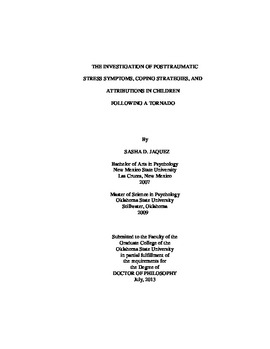| dc.contributor.advisor | Sullivan, Maureen A. | |
| dc.contributor.author | Jaquez, Sasha D. | |
| dc.date.accessioned | 2014-09-24T14:16:59Z | |
| dc.date.available | 2014-09-24T14:16:59Z | |
| dc.date.issued | 2013-07 | |
| dc.identifier.uri | https://hdl.handle.net/11244/11022 | |
| dc.description.abstract | Scope and Method of Study: | |
| dc.description.abstract | This project was designed to assess long-term posttraumatic stress symptoms, coping strategies and attributions in two groups of children. The first group of children was exposed to a single tornado in May 2010. The second group of children was exposed to multiple tornadoes during the same time period. Parents provided information about their children's exposure to the tornado(es), symptoms of posttraumatic stress symptoms, and general overall functioning. Children provided information about their own symptoms of posttraumatic stress symptoms, use of coping strategies, and attributions at two different data collection points (20-months and 23-months post-disaster). | |
| dc.description.abstract | Findings and Conclusions: | |
| dc.description.abstract | This project provided long-term follow-up for two groups of children who were exposed to either a single tornado or multiple tornadoes in May 2010. The results of the study show that even two years post-disaster, children in both the single and multiple exposure groups were exhibiting elevated levels of posttraumatic stress symptoms, but were continuing to exhibit normal levels of functioning. Both groups of children reported using numerous coping strategies and multiple attributions to deal with the tornados. Given that the use of coping strategies and attributions were significantly correlated with symptoms of posttraumatic stress at both time points, findings may suggest that the children have learned to adapt to the tornado exposure. Between the two groups, children in the multiple exposure group reported higher levels of PTSS, use of more coping strategies, and making more attributions than the children from the single exposure group. Exploratory analyses were conducted to examine differences in the use of positive and negative coping strategies, and individual attributions. The results of the study provide valuable information to contribute to gaps in the literature about PTSS, use of coping strategies, and attributions over a longer term following exposure to either a single or multiple traumas. Furthermore, this is one of few studies that have assessed long-term symptoms of posttraumatic stress longitudinally following exposure to tornadoes. | |
| dc.format | application/pdf | |
| dc.language | en_US | |
| dc.rights | Copyright is held by the author who has granted the Oklahoma State University Library the non-exclusive right to share this material in its institutional repository. Contact Digital Library Services at lib-dls@okstate.edu or 405-744-9161 for the permission policy on the use, reproduction or distribution of this material. | |
| dc.title | Investigation of posttraumatic stress symptoms, coping strategies, and attributions in children following a tornado | |
| dc.contributor.committeeMember | Beasley, Lana O. | |
| dc.contributor.committeeMember | Chaney, John M. | |
| dc.contributor.committeeMember | Schwerdtfeger, Kami L. | |
| osu.filename | Jaquez_okstate_0664D_12416.pdf | |
| osu.accesstype | Open Access | |
| dc.type.genre | Dissertation | |
| dc.type.material | Text | |
| dc.subject.keywords | attributions | |
| dc.subject.keywords | coping | |
| dc.subject.keywords | natural disaster | |
| dc.subject.keywords | posttraumatic stress symptoms | |
| thesis.degree.discipline | Clinical Psychology | |
| thesis.degree.grantor | Oklahoma State University | |
